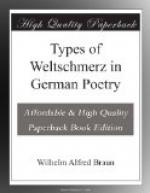In accounting for the tremendous effect produced by his “Werther,” Goethe compares his work to the bit of fuse which explodes the mine, and says that the shock of the explosion was so great because the young generation of the day had already undermined itself, and its members now burst forth individually with their exaggerated demands, unsatisfied passions and imaginary sufferings.[6] And in estimating the influences which had prepared the way for this mental disposition, Goethe emphasizes the influence of English literature. Young’s “Night Thoughts,” Gray’s “Elegy,” Goldsmith’s “Deserted Village,” even “Hamlet” and his monologues haunted all minds. “Everyone knew the principal passages by heart, and everyone believed he had a right to be just as melancholy as the Prince of Denmark, even though he had seen no ghost and had no royal father to avenge.” Finally Ossian had provided an eminently suitable setting,—under the darkly lowering sky the endless gray heath, peopled with the shadowy forms of departed heroes and withered maidens. To quote the substance of Goethe’s criticism:[7] Amid such influences and surroundings, occupied with fads and studies of this sort, lacking all incentive from without to any important activity and confronted by the sole prospect of having to drag out a humdrum existence, men began to reflect with a sort of sullen exultation upon the possibility of departing this life at will, and to find in this thought a scant amelioration of the ills and tedium of the times. This disposition was so general that “Werther” itself exerted a powerful influence, because it everywhere struck a responsive chord and publicly and tangibly exhibited the true inwardness of a morbid youthful illusion.[8]
Nor did the dawning nineteenth century bring relief. No other period of Prussian history, says Heinrich von Treitschke,[9] is wrapped in so deep a gloom as the first decade of the reign of Frederick William III. It was a time rich in hidden intellectual forces, and yet it bore the stamp of that uninspired Philistinism which is so abundantly evidenced by the barren commonplace character of its architecture and art. Genius there was, indeed, but never were




